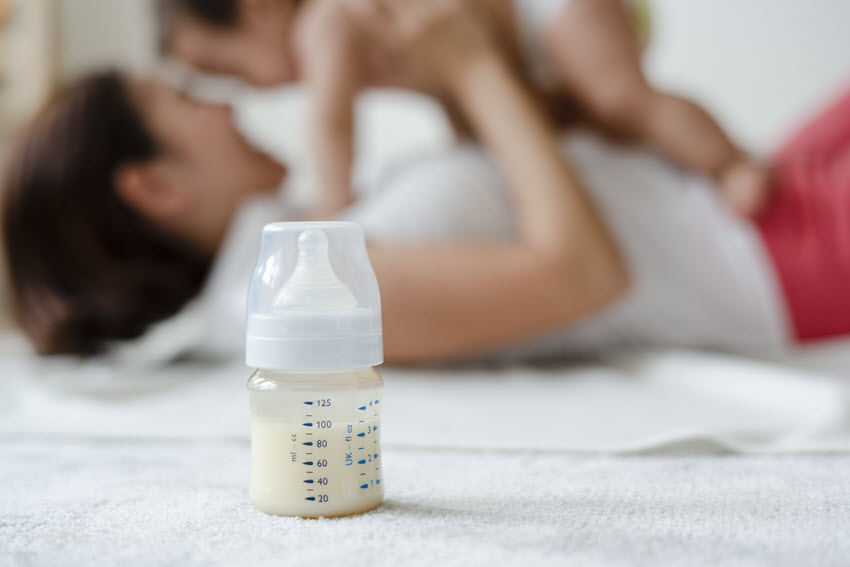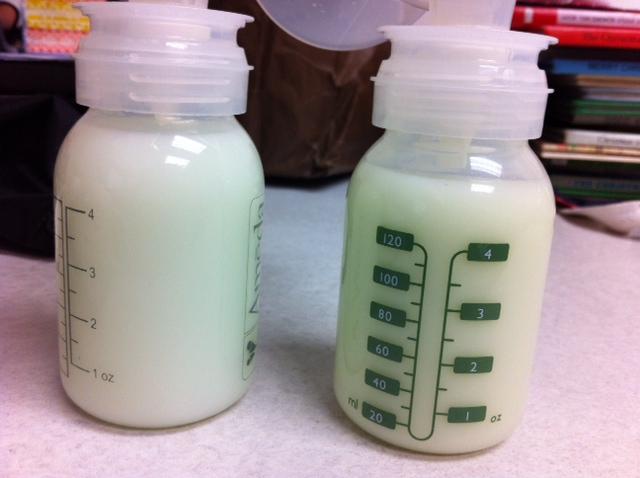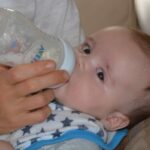When I think back to my kids as babies, I remember them having that “fresh baby smell”. What wasn’t such a pleasant scent, however, were the farts.
View in gallery
Baby gas isn’t concerning on its own since everyone farts, but when baby gas smells like rotten eggs or sulfur, it’s time to investigate.
This odor usually has an underlying cause, so let’s learn more about the smell so that you may help your baby feel less gassy and smell wonderful again.
Why Does my Newborn’s Gas Smell like Sulfur?
It may be a surprise that a newborn can have such harsh gassy odors when all they do is drink formula or breast milk. Unfortunately, those can be the root cause of sulfur-smelling gas.

Formula
If your newborn is on formula, they may be struggling to digest it. Check with your formula to see whether or not it contains lactose. That type of formula may not work itself through your baby’s digestive system well, which can lead to gas that has a strong odor.
Also, perhaps your baby has a general formula intolerance. If you notice other symptoms such as your baby has smelly gas and green poop, consider consulting with your doctor about switching formulas.
- Contains one 19.5 ounce reusable tub of baby formula milk powder
- Enfamil NeuroPro Gentlease is the only sensitive baby formula that has a fat protein blend of MFGM and Omega 3 DHA, previously only found in breast milk, that is clinically proven to reduce fussiness, colic, baby gas, and crying in 24 hours
- Emerging evidence from a recent clinical study showed MFGM in baby formula provides cognitive brain support similar to breast milk
Prices pulled from the Amazon Product Advertising API on:
Product prices and availability are accurate as of the date/time indicated and are subject to change. Any price and availability information displayed on [relevant Amazon Site(s), as applicable] at the time of purchase will apply to the purchase of this product.
Another common condition for babies is Colic. Colic is when a baby cries frequently for a long period of time. If you notice your baby is crying for more then 3 hours a day, they might have colic. This can cause further trouble like constant fidgeting, poor sleep, and trouble with breastfeeding. You may want to try a formula for colic, which may help your baby feel more comfortable. You might also be interested in our article, Colic Calm vs Gripe Water. We discuss which is better for helping your baby with gas pains.
Breast Milk
You may be thinking then: what if I’m just giving them breast milk? In that case, you may be the culprit behind their rotten eggs smell.
It’s time to take a look at your own diet. There are many foods that can cause sulfur-smelling gas in us such as eggs and vegetables like broccoli and cabbage. Even dairy can negatively affect our gas.
Whatever a breastfeeding mother eats goes right into their babies. So, consider weeding out certain sulfur-rich foods to see if your baby’s gas shows improvement.
If you consume dairy a lot, it may be a good idea to go a week or so without it. As I mentioned about formula, lactose doesn’t always work well in our little one’s system, or our own for that matter.
Once you discover the guilty party, you can begin to adjust your diet accordingly and wait for it to work itself out of your baby’s system.
Why Does my Baby Fart so Much?
Babies fart just like the rest of us. Whether it smells or not, gas can build up inside of them, and it has to come out one way or another.
In fact, did you know that babies can actually pass gas around 20 times a day?
Generally, excessive gas is due to your baby swallowing too much air. They have plenty of opportunities to do so. It happens when they’re crying, and it happens when they’re eating.
If you notice your baby farting constantly, there may be some other reasons they’re sucking in a lot of air.
Awkward Feeding Position
Whether you’re breastfeeding your baby or you’re giving them a bottle, an awkward feeding position can cause excessive gas.
Consider shifting them so that their heads remain higher than their stomachs. This way, the air sits at the top of their stomach while the milk settles, and from there, you can help them burp out the gas.
Bottle Issues
Maybe the thing behind your baby’s constant gas is their bottle. They may need to use a nipple that has a slower flow as that can eliminate the amount of air they suck in.
Also, when you’re feeding them, try tipping the bottle more upwards as this can cut out any potential air bubbles in the nipple.
- Comotomo baby bottles are deisgned to most closely mimic breastfeeding to reduce bottle rejection and nipple confusion issues
- Ultra wide-neck design allows easy cleaning by hand without a brush. Nipple and body is made of 100% safe hygienic silicone
- Safe in microwave, boiling water, dishwashers and sterilizers
Prices pulled from the Amazon Product Advertising API on:
Product prices and availability are accurate as of the date/time indicated and are subject to change. Any price and availability information displayed on [relevant Amazon Site(s), as applicable] at the time of purchase will apply to the purchase of this product.
Baby has Smelly Wind but no Poo
So, you’ve noticed that your baby is pushing out quite a deal of smelly farts, but they’re not actually pooping.
Babies don’t exactly have a normal schedule for their bowel movements, so it’s not completely out of the ordinary if they’re not pooping from time to time. However, if their stool is difficult to pass, but they still have that frequent gas, they may be constipated.
You can tell your baby is constipated based on different symptoms beyond tough and infrequent bowel movements. They may be straining whenever they try to pass a bowel movement, and their stomachs may feel tight or look bloated.
For babies with frequent, foul-smelling gas, then you’ll probably notice their swollen abdomen more than anything. It’s a clear sign that their little bellies are filled up with gas.
How to Encourage a Bowel Movement
To help them manage constipation, you’ll need to first address why they can’t poop. Have you started introducing them to solid foods? Their bodies may need time to learn to digest it properly, which can lead to smelly gas without any pooping.
For these babies, you can try introducing oatmeal cereal as that’s easier digested compared to rice cereal. You may even consider adding 100% fruit juice like pear and apple juice to their diet.
- SINGLE GRAIN CEREAL: This single grain oatmeal cereal features Vitamins C, E, Zinc & 6 B vitamins for healthy development, plus calcium for healthy bones & teeth. No artificial colors or flavors.
- SOLID STARTER: Single-grain infant cereals are an ideal first solid food to check for food sensitivities & help develop babys eating skills. Just 2 servings meets 90% of your babys daily iron needs.
- PEDIATRICIAN RECOMMENDED: Gerber Cereal is the #1 pediatrician-recommended brand for infant cereals among pediatricians who recommend infant cereal.
Prices pulled from the Amazon Product Advertising API on:
Product prices and availability are accurate as of the date/time indicated and are subject to change. Any price and availability information displayed on [relevant Amazon Site(s), as applicable] at the time of purchase will apply to the purchase of this product.
Don’t resort to anything like laxatives unless your doctor recommended it. Once they start having consistent bowel movements, all that foul gas may dissipate.
Why Does my Baby Cry When Passing Wind?
Thinking about my early parenting years, I remember how it seemed like my baby would just cry over everything. They cry when they’re hungry, cry when they’re sleepy, or they may cry because they have nothing else to do.
Because of this, it can be tough knowing if they’re crying because they’re passing gas, or if their wails are due to something else.
View in gallery
If you want to be sure it’s because of the gas, check out their stomach. Does it feel tight or appear bloated? Like previously mentioned, these are obvious signs that there’s too much gas in their stomach.
Also, your baby may lie on their side to pass gas, or they may even squirm around more often than usual every time.
Not only will your baby experience frequent flatulence, but also discomfort and pain in your baby. It’s due to the amount of pressure on their tummies from the pockets of gas.
Handling the gas inside of them is the main way you can help relieve them of their painful flatulence.
My Baby’s Burps Smell like Poop
Just as common as it is for babies to fart, they need to burp to release some of that gas. The gas that comes out of their mouth is usually odorless, especially if they’re not eating solid foods. However, there’s a chance it can smell like poop. This can happen to anyone, so it’s not odd to notice it in your baby.
The most common cause for this in your baby may be a bowel obstruction. This can be brought on by a narrowing of the small intestines.
If you notice the bad-smelling burps in addition to a tight stomach or infrequent bowel movements, those may be further indications that an obstruction is behind all these issues.
It’s important to have your baby seen by their pediatrician as early as possible in this case. Bowel obstructions may be indicators of other serious conditions or lead to additional complications.
If not a bowel obstruction, then perhaps the smell is based on a stomach infection.
No matter the case, remember to take your baby in for a checkup so that your doctor can rule certain conditions out. From there, you’ll learn how to manage the situation.
Breast Milk Smelling like Rotten Eggs
Each of us mothers can produce our own unique breast milk that our babies will instantly recognize. However, the smell, taste, and texture can change based on a number of factors.
If you’ve noticed that your breast milk has a sour, rotten eggs smell to it, consider how you handled the milk after you pumped it. The smell can easily come if the milk wasn’t stored properly. It’s the same as if you’ve left regular cow’s milk out to spoil.
View in gallery
For those of you who notice the smell and your baby is directly breastfeeding, then the cause of the odor may be due to your diet.
From what I explained earlier on about how your diet can affect your baby’s gas, it may lead to your breast milk smelling off. So, I’ll suggest again readjusting your diet to see if the changes have any effects on your milk.
Conclusion
Baby farts may smell like rotten eggs because they often drink a lot of fiber-rich foods that contain sulfur. Breast milk contains high concentrations of sulfur amino acids. Your diet may also include foods that contain sulfur, passed on during breastfeeding. This can cause wind that smells like rotten eggs.
Sulfur is a harsh smell, and when it comes out of our babies whether through their farts or their burps, it can be worrisome. There’s no need to panic, however.
Merely take a look at your own diet if you’re breastfeeding or consider the bottles they’re using. If all else fails, your pediatrician is more than eager to do an exam to see if there are any other causes like constipation or bowel obstruction.
The sooner you manage the problem, the sooner your baby will be back to their bubbly, carefree self.






